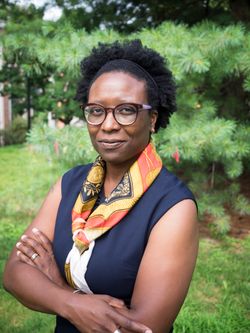vox populi
To envision an alternative future, we need to reconceptualize who is a laborer, what
they do, and where they are. The second annual
Eberly Roundtable will engage attendees in a process of reimagining labor’s
future driven by a better understanding of labor in the present.
Examining Appalachia through the Eberly Roundtable
 Written by Lupe Davidson, Eberly's Associate Dean for Social Justice, Faculty Development
and Innovation and a Woodburn Professor of Women’s and Gender Studies.
Written by Lupe Davidson, Eberly's Associate Dean for Social Justice, Faculty Development
and Innovation and a Woodburn Professor of Women’s and Gender Studies.
In 2021, the Eberly College of Arts and Sciences invited faculty, staff, students and the entire Mountaineer community both near and far to the first annual Eberly Roundtable. The Eberly Roundtable creates an environment to examine and discuss critical issues like race, rurality, the changing nature of work, indigeneity and displacement, immigration, poverty and economic precarity from an Appalachian standpoint. It explores these issues outside of stereotypical representations of some books, scholarship and news reporting on Appalachia.
Most often, discussions about race, place and identity are driven by “elite,” private institutions on either coast. Voices from Appalachia are often silenced or dismissed from these conversations. Nevertheless, Appalachia is a region steeped in pride and brimming with creativity. Appalachia also possesses a rich cultural and intellectual legacy producing artists like Bill Withers (Slab Fork, West Virginia) and prominent academics like bell hooks (Hopkinsville, Kentucky) and Henry Louis Gates, Jr (Keyser, West Virginia) who have added significantly to the nations discourse and heritage. The Eberly Roundtable seeks to amplify Appalachia’s centrality, Appalachian voices, and Appalachia’s importance in national discussions.
Organized by Dr. Maria del Guadalupe Davidson, Woodburn Profess of Women’s and Gender Studies and Associate Dean for Faculty, the theme of the first Roundtable was race, place, and identity. This two-day transdisciplinary event brought together academic and public scholars, artists, and intellectuals to discuss blackness, black identity, black agency, and black presence in Appalachia.
Day one featured Dr.William H. Turner and the launching of his book The Harlan Renaissance: Stories of Black Life in Appalachian Coal Towns (WVU Press, 2021).
Day two featured five 90-minute roundtable discussions on a wide range of topics that explored black presence, black being, and black resistance in Appalachia. Roundtable presenters and respondents were chosen from different academic disciplines to encourage rich, creative, and generative conversations.
The event ended with a performance by folk performers Sparky and Rhonda Rucker and a poetry reading by Prof. Renee Nicholson and West Virginia Poet Laurate Mark Harshman.
The 2022 Eberly Roundtable theme of labor links the research interests of our academic community with the needs of our region. It is being organized by Scott Davidson, Professor of Philosophy, and Dr. Jessica Wilkerson, Associate Professor and Joyce and Stuart Robbins Chair of History.
This year’s featured speaker will be the historian Dr. Joe Trotter. Dr. Trotter is a leading scholar in the field of black labor in Appalachia, and he will speak about his recently published book African American Workers and the Appalachian Coal Industry (WVU Press, 2022).
A full day of interdisciplinary panels on labor issues will be linked by several broad themes. One is the contrast between hyper-visible and invisible forms of labor, for example, between coal mining and invisible labor in service industries. Cultural labor sometimes reinforces and magnifies well-established conceptions of labor, with the John Henry legend as a case in point. But new scholarship can also help to us to think about a familiar story in ways that speak to the present. Accordingly, one panel will examine the benefits and risks of “John Henryism”, in which individuals feel compelled to overwork and overachieve. Cultural labor can also help new stories to be told. The effort to make invisible forms of labor visible is evident in the work of the Appalachia-based scholar, bell hooks. Honoring her legacy, panelists will discuss the various ways in which her work draws needed attention to diverse forms of labor and experiences in Appalachia that are often overlooked and unacknowledged.
Another panel theme involves the social reproduction of labor in which the past replicates itself in the present and future. One panel will situate this process in the context of the construction of prisons on the sites of former mining communities, while another roundtable discussion between scholars and community members will discuss what the future labor movement looks like in comparison with its past. In addition to the panels, this year’s event will include an interactive gallery with exhibited art, community organizations, information, and much more.
To envision an alternative future, we need to reconceptualize who is a laborer, what
they do, and where they are. The second annual
Eberly Roundtable will engage attendees in a process of reimagining labor’s
future driven by a better understanding of labor in the present.